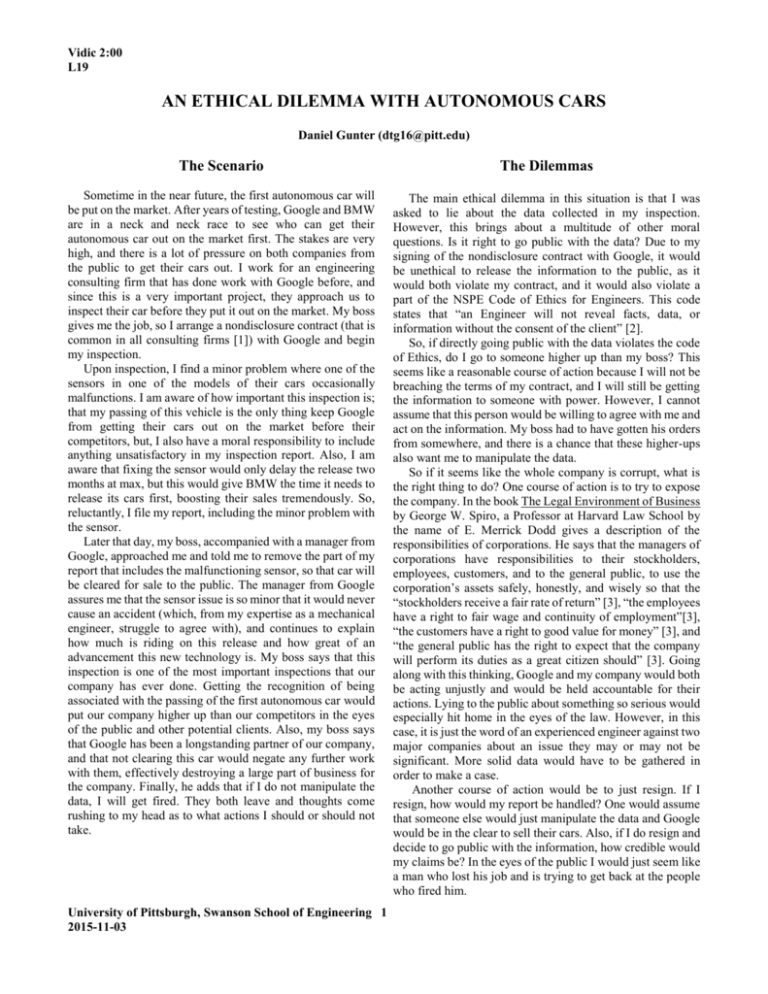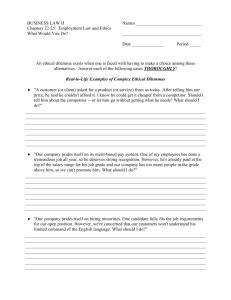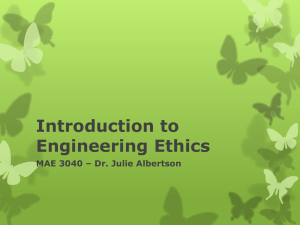Writing Assignment 3 - University of Pittsburgh
advertisement

Vidic 2:00 L19 AN ETHICAL DILEMMA WITH AUTONOMOUS CARS Daniel Gunter (dtg16@pitt.edu) The Scenario The Dilemmas Sometime in the near future, the first autonomous car will be put on the market. After years of testing, Google and BMW are in a neck and neck race to see who can get their autonomous car out on the market first. The stakes are very high, and there is a lot of pressure on both companies from the public to get their cars out. I work for an engineering consulting firm that has done work with Google before, and since this is a very important project, they approach us to inspect their car before they put it out on the market. My boss gives me the job, so I arrange a nondisclosure contract (that is common in all consulting firms [1]) with Google and begin my inspection. Upon inspection, I find a minor problem where one of the sensors in one of the models of their cars occasionally malfunctions. I am aware of how important this inspection is; that my passing of this vehicle is the only thing keep Google from getting their cars out on the market before their competitors, but, I also have a moral responsibility to include anything unsatisfactory in my inspection report. Also, I am aware that fixing the sensor would only delay the release two months at max, but this would give BMW the time it needs to release its cars first, boosting their sales tremendously. So, reluctantly, I file my report, including the minor problem with the sensor. Later that day, my boss, accompanied with a manager from Google, approached me and told me to remove the part of my report that includes the malfunctioning sensor, so that car will be cleared for sale to the public. The manager from Google assures me that the sensor issue is so minor that it would never cause an accident (which, from my expertise as a mechanical engineer, struggle to agree with), and continues to explain how much is riding on this release and how great of an advancement this new technology is. My boss says that this inspection is one of the most important inspections that our company has ever done. Getting the recognition of being associated with the passing of the first autonomous car would put our company higher up than our competitors in the eyes of the public and other potential clients. Also, my boss says that Google has been a longstanding partner of our company, and that not clearing this car would negate any further work with them, effectively destroying a large part of business for the company. Finally, he adds that if I do not manipulate the data, I will get fired. They both leave and thoughts come rushing to my head as to what actions I should or should not take. The main ethical dilemma in this situation is that I was asked to lie about the data collected in my inspection. However, this brings about a multitude of other moral questions. Is it right to go public with the data? Due to my signing of the nondisclosure contract with Google, it would be unethical to release the information to the public, as it would both violate my contract, and it would also violate a part of the NSPE Code of Ethics for Engineers. This code states that “an Engineer will not reveal facts, data, or information without the consent of the client” [2]. So, if directly going public with the data violates the code of Ethics, do I go to someone higher up than my boss? This seems like a reasonable course of action because I will not be breaching the terms of my contract, and I will still be getting the information to someone with power. However, I cannot assume that this person would be willing to agree with me and act on the information. My boss had to have gotten his orders from somewhere, and there is a chance that these higher-ups also want me to manipulate the data. So if it seems like the whole company is corrupt, what is the right thing to do? One course of action is to try to expose the company. In the book The Legal Environment of Business by George W. Spiro, a Professor at Harvard Law School by the name of E. Merrick Dodd gives a description of the responsibilities of corporations. He says that the managers of corporations have responsibilities to their stockholders, employees, customers, and to the general public, to use the corporation’s assets safely, honestly, and wisely so that the “stockholders receive a fair rate of return” [3], “the employees have a right to fair wage and continuity of employment”[3], “the customers have a right to good value for money” [3], and “the general public has the right to expect that the company will perform its duties as a great citizen should” [3]. Going along with this thinking, Google and my company would both be acting unjustly and would be held accountable for their actions. Lying to the public about something so serious would especially hit home in the eyes of the law. However, in this case, it is just the word of an experienced engineer against two major companies about an issue they may or may not be significant. More solid data would have to be gathered in order to make a case. Another course of action would be to just resign. If I resign, how would my report be handled? One would assume that someone else would just manipulate the data and Google would be in the clear to sell their cars. Also, if I do resign and decide to go public with the information, how credible would my claims be? In the eyes of the public I would just seem like a man who lost his job and is trying to get back at the people who fired him. University of Pittsburgh, Swanson School of Engineering 1 2015-11-03 Daniel Gunter What if I do manipulate the data? Google claimed that the faulty sensor is so minor that it could not cause an accident to occur, so if there is no threat to the public, I could potentially do it and still abide by the NSPE code. However, manipulating data is never morally or ethically right. However, for the sake of discussion, let’s say that I do manipulate the data, with a sort of hope-and-pray mentality that Google is right and no one will get hurt. This could have one of two results. The first is that Google releases their selfdriving cars, everyone is happy because they work just as expected, and the number of traffic accidents is significantly reduced. That is the happy ending. The second is that the people who buy the models with the faulty sensor start getting into accidents. After reading descriptions of the accidents, I realize that the accidents were caused by the failure of the sensor that I had initially discovered. What do I do from here? The Institution of Mechanical Engineers says that Engineers shall conduct their work in regard with the welfare of the people and the organizations that they work with [4]. This means that I would have violated my code of conduct, and put people’s lives at risk. the structure would be very large. Dismissing the mistake and thinking that the building will be fine could also harm his reputation, due to the building potentially collapsing, killing thousands in the process [6]. So, Dr. X must choose between telling the Building’s owners that he has made a mistake, or hoping that the structure will be able to stand, regardless of his mistake. A third case study that helped me during research was a case that did not relate to my situation directly, but rather to the problems in the NSPE Code of Ethics that I run into. This problem is that releasing the information about the sensor to the public violates one part of the Code, and not releasing the information violates another. In this third case study, Engineer A signs a confidentiality agreement with one his clients and then does his job of inspecting the structural integrity of an old building the client is trying to sell. While inspecting the building, the engineer notices a problem with the electrical system that could be potentially harmful to the inhabitants. He makes a note of this finding in his report, as well as tells his client about his concern. His client thanks him and tells him that the building is being sold “as is” and that no more repairs are going to be made. The Engineer wants to tell the potential buyers and local authorities about the problem with the electrical systems, but ends up not saying anything due to the confidentiality agreement between him and his client [7]. This scenario brings up a conflict between two points in the NSPE Code of Ethics that directly affects my ethical dilemma. These points are that “Engineers shall hold paramount the health, safety, and welfare of the public” [2] and that “Engineers shall not reveal facts, data, or information without the prior consent of the client or employer” [2]. In the case study, the NSPE Board of Ethical Review ruled that although revealing and not revealing the information both break the ethical code, the safety of the public must take precedence over the confidentiality [7]. Relevant Case Studies When I began researching this dilemma, the first thing I looked at was case studies. A large factor affecting my decision is the relationship between my company and Google. Case Study 1010 on Texas Tech’s ethics cases page discusses a woman who experienced a similar problem. The woman, Julia, prides herself on the relationships between her and her clients. One of her clients asks her to inspect the windows of a building that he is trying to sell, and, during the inspection, she finds a problem with something other than the windows. She mentions it to the client, but he says that he is not going to do anything about it [5]. In both Julia’s and my cases, the relationship with clients is a large factor in determining what course of action to take. However, according to the NSPE Code of Ethics for Engineers, Engineers must “Hold Paramount the safety, health, and welfare of the public” [2]. So, following this guideline, and the Institution of Mechanical Engineer’s code, I would not change my report, because it makes the safety of the public more important than passing a potentially dangerous product. Another factor affecting my decision is my reputation. By this point in my career, I have built a good name for myself as a mechanical engineer. If I go public with the information and am wrong, then my reputation will be ruined. The same result will happen if I refuse to comply with the demands of my boss (as he will probably spread word of my incompetence). In a case study called “The Cost of Integrity” on the webguru webpage, a renowned structural engineer referred to as “Dr. X” comes to the realization that he made a serious mistake in his calculations for one of his more famous structures, and, because of this mistake, the structure is at risk of collapsing. Bringing the information to the building’s owners would ruin his reputation because the cost of fixing Ethics in Engineering Ethics within the engineering field in general is an important topic to discuss. Engineering is field that focuses on innovation and advancing technology, but sometimes lacks the concern for moral implications. In an article about William Marcy, executive director of the Murdough Center for Engineering Professionalism/National Institute for Engineering Ethics, it is stated that, “Making an ethical decision is thinking about the lifecycle of a project or product or design, not just assuming everything is fine” [8]. Marcy then goes on to explain the exciting innovation of electric cars. He says, “It’s very interesting because you would think about the responsibility of the safety of the car—but what about the batteries?” The car will eventually end up in a dump somewhere, and those batteries are harmful to the environment, so what methods has the company put in place to ensure that the batteries are properly disposed of [8]? 2 Daniel Gunter [7] (2014). “Public Health and Safety-Delay in Addressing Fire Code Violations”. National Society of Professional Engineers. (case study). http://www.nspe.org/sites/default/files/BER%20Case%20No %2013-11-FINAL.pdf [8] E. Butterman. (2014). “Ethics in Engineering”. American Society of Mechanical Engineers. (online article). https://www.asme.org/engineeringtopics/articles/engineering-ethics/ethics-in-engineering [9] D. Gunter. (2015, October 31). Email. I think that Marcy brings up a very good point here. In the excitement of inventing new technologies, it is hard to think about all of these factors. As engineers, we tend to think “oh that’s a really cool idea, let’s make it happen” and jump right into building or designing, rather than taking a step back and considering the implications of what we are trying to do. To get another, more real-world perspective on ethics, I talked to my father, who is a supply chain analyst in an engineering consulting firm. He said that from a business ethics standpoint, when dealing with problems in a design, it is always better to confront the problem, no matter how far into the process, rather than ignoring it. It is much better to discover the mistake and to go back and fix it, rather than ignoring the mistake because the project is “too far along”. In the end, more money and resources will be saved. [9] Acknowledgements I would like to thank my mother and my friend Ben Reynolds for proofreading my paper, as well as my father for giving me his thoughts on ethics in his career. Conclusion After researching this ethical dilemma scenario and other similar case studies, I have to come to realize that ethical dilemmas are rarely a simple decision. There are usually many factors that come into play, some that I had never even thought about until researching these different scenarios (for example, I would not have thought about the disposal of the battery in an electric car, as mentioned above by Marcy.) With my newly acquired knowledge of codes of ethics, and after looking at case studies that involved similar situations to the one I was in, I have decided that I would go public with the information by informing ethical authorities and having them handle the situation. Acting in this manner keeps me in line with the NSPE Code of Ethics, as well as gets the information to people who I know will handle it the right way. (2353) References [1] C. Berman; and D. Media (2015). “Ethics and Consulting Firms.” Chron. (online article). http://smallbusiness.chron.com/ethics-consulting-firms72348.html [2] (2015). “NSPE Code of Ethics for Engineers”. National Society of Professional Engineers. (website). http://www.nspe.org/resources/ethics/code-ethics [3] G. Spiro. (1989). The Legal Environment of Business. Anglewood Cliffs, NJ: Prentice-Hall. (print book). pp. 37 [4] (2015). “Ethics”. Institution of Mechanical Engineers. (website). http://www.imeche.org/about-us/governance/ethics [5] (2015). “Ethics Cases.” Texas Tech University. (case study). http://www.depts.ttu.edu/murdoughcenter/products/cases.ph p [6] (2014). “The Cost of Integrity”. Webguru. (case study). http://www.webguru.neu.edu/professionalism/casestudies/cost-integrity 3






